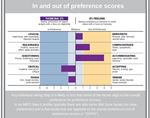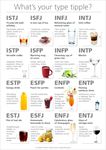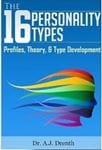Team development
Talking psychometrics with the Start, Scale, Grow podcast
Kevin Wood, Global Marketing
Talent selection, remote working, and psychological safety are among the topics covered on the Start, Scale, Grow podcast with consulting psychologist Cameron Nott
How Australia Post used MBTI personality type to build trust and increase productivity
Vanessa Bradford
Managers have a lot on their plate – from exceeding customer expectations to taking care of their employees. This blog explains how sales and operations managers at Australia Post improved company success by using the MBTI personality assessment to build trust and collaboration.
Why knowing your personality type is critical to a growth mindset
Global Marketing, The Myers-Briggs Company
If people think ability is innate, it could be holding them back
How personality type affects team performance and job satisfaction
Global Marketing, The Myers-Briggs Company
New research sends clear message to team leaders
Why and how innovative organizations welcome conflict
Global Marketing, The Myers-Briggs Company
Effective conflict management is a pillar of high-performing organizations
Uncover the (in)visible elements of team success
Author Vanessa Bradford
There are many psychological factors that affect team success. This article helps managers and leaders understand how those factors affect performance – and why the MBTI personality assessment is one of the best opportunities for growth.
Leadership wake-up call: how’s your team’s orientation?
Vanessa Bradford
In the workplace, there are hidden elements that can make or break team success. This blog post helps managers and leaders understand the importance of team orientation – and the role inclusive leadership plays in boosting it.
To build better teams, start by building trust
Vanessa Bradford
At work, there are hidden elements that can make or break team success. This blog post helps managers and leaders understand how inclusion – and inclusive leadership – cultivates the trust and psychological safety that teams need to be effective.
The worst thing about teams? Poor leaders
Kevin Wood, The Myers-Briggs Company
New research explores team performance, job satisfaction, and the role of personality type
Enhancing communication in teams
Melissa Summer, The Myers-Briggs Company
In this post we explore practical strategies for improving team communication and recommend tips to improve how team members interact on the job.
Working Across Cultures
Melissa Summer, The Myers-Briggs Company
What are the biggest challenges people face working across cultures? Listen to this episode of The Myers-Briggs Company Podcast with Frank Garten, cross-cultural expert and global leadership trainer to learn how to mitigate cultural challenges and improve communication.
Overcoming team communication challenges
Melissa Summer, The Myers-Briggs Company
In this post, based on an interview with Myers-Briggs Professional Services Principal Consultant and Depth Psychologist Dr. Marta Koonz, we discuss communication in teams, the psychological needs of teams, and their impact on collaboration.
Happiness and profit are synergistic
Global Marketing, The Myers-Briggs Company
Why well-being is crucial to employee and organizational performance
To be an inclusive leader, you need to understand and respect personality preferences
Global Marketing
What does inclusion look like for executives and the people they lead?
In-person development and the importance of human synchronization
Melissa Summer, The Myers-Briggs Company
What is human synchronization and why is it important for learning and development trainers, consultants and coaches to consider?
Measuring the behaviors of successful, inclusive leaders with the FIRO-B tool
Author Vanessa Bradford
Did you know that interpersonal behaviors can be measured in an objective way? Through the FIRO-B® assessment, HR professionals and leadership consultants can check how well a person’s behaviors cultivate inclusion and success in the workplace.
Inclusion is a priority, but how do leaders actually become inclusive?
Global Marketing
Research shows there’s a self-perception gap when leaders assess their inclusion efforts
Introverts in conflict: what we learned in 2022
Kevin Wood, The Myers-Briggs Company
New research and data shows how different personality types approach conflict. But what does it mean for Introverted types?
Will Gen Z usher in a new generation of work-related conflict?
Global Marketing
Awareness of different approaches to conflict could help multi-generational workforces understand each other and work together better.
Use conflict as a health check for your team
Kevin Wood, The Myers-Briggs Company
Is lack of conflict a sign of dysfunction? And what do people feel about conflict today?
How to build a more effective hybrid workplace
Global Marketing, The Myers-Briggs Company
Paying closer attention to employee needs is the way to make remote, in-office, and hybrid teams function better
What are the new sources of conflict at work?
Kevin Wood, The Myers-Briggs Company
Learn the types and causes of conflict to be better prepared in how you manage conflict
Conflict at work: what are your options?
Melissa Summer, The Myers-Briggs Company
If conflict management is something you dread, here’s how to start turning it around
Conflict Management
Melissa Summer, The Myers-Briggs Company
How can conflict management save organizations money?
Leadership, Extraversion & Introversion
Melissa Summer, The Myers-Briggs Company
What should leaders be aware of about these well-known personality differences?
Introducing The Myers-Briggs Company Podcast
Melissa Summer, The Myers-Briggs Company
The Myers-Briggs Company is launching a new podcast about psychology, personality, work life, and how to get the best from life.
Were you asked if you wanted to go back to the office?
Kevin Wood, The Myers-Briggs Company
If not, you might be part of a hybrid strategy that’s about to fail.
Social contracts, returning to the office and retaining your people in the new hybrid workplace
Melissa Summer, The Myers-Briggs Company
As employees return to the office, they’re expecting more flexibility in their social contracts with employers. How can HR help?
Using interpersonal needs to make the hybrid model work for teams
Melissa Summer, The Myers-Briggs Company
Is it possible to get the best of both worlds with hybrid work?
How to develop high potential people using MBTI personality insights
Melissa Summer, The Myers-Briggs Company
HR professionals get insight into team dynamics, individual strengths and more with potential leaders when using the Myers-Briggs Type Indicator assessment.
Using Personality Assessments for Team Building
Melissa Summer, Global Content Marketing Manager
How can personality assessments like the MBTI tool help teams work together more effectively and understand each other better?
Patrick Lencioni on team trust, vulnerability, and the MBTI® assessment
Kevin Wood, Writer at The Myers-Briggs Company
The author of 5 Dysfunctions of a Team shares his insights on the MBTI assessment for individual and team development...
The Platinum Rule for business
Rachel Cubas-Wilkinson, Senior Consultant, The Myers-Briggs Company
How observing the Platinum Rule builds stronger workplace relationships
Trust and remote working
Helen Rayner, Thought Leadership Lead Consultant, The Myers-Briggs Company
What can you do to help maintain positive relationships remotely?
People need people!
Nikhita Blackburn, Thought Leadership Lead Consultant, The Myers-Briggs Company
Tips for working from home
Making a social impact
Helen Denny, Head of Global Customer Experience, The Myers-Briggs Company
Reflections on our first charity partnership
The importance of purpose
Will Cleare, Head of HR (Europe), The Myers-Briggs Company
How developing your business goals can increase engagement
The changing shape of teams
The Myers-Briggs Company
Teams and Google’s Project Aristotle
Type and teams
Helen Rayner, Lead Consultant at The Myers-Briggs Company
Take our survey on personality and teamwork
How to motivate the people you manage
Melissa Summer, PR and Content Marketing Manager at The Myers-Briggs Company
Motivation - more than 'get it done’
Six things managers and executives can do to improve company culture
Jeff Hayes, President and CEO of The Myers-Briggs Company
6 things managers and executives can do
Are some personality types happier than others?
The Myers-Briggs Company
Read our latest research on well-being
Are you a gig worker?
John Hackston, Head of Thought Leadership for The Myers-Briggs Company
If you aren’t sure, read on…
The Psychology of Change
Melissa Summer, Content Marketing and PR Manager at The Myers-Briggs Company
There’s an important part of business growth that’s often overlooked – change.
The changing world of work

MBTI Talk
PeopleFWD 2018 promises insights and practical solutions
Together, not together

John Hackston, Head of Thought Leadership, OPP
Want to stop people speaking to each other? Put them in an open-plan office
Hidden figures

Katy Lyne, Principal Consultant, OPP
Gender, leadership and the pressure of organisational culture
Le Tour de France – it's all about high-performing teams

Claire Bremner, Senior Consultant at OPP
Cycling-inspired tips for team and leadership development
Decoding communication issues between MBTI Types

Betsy Kendall, COO and Head of Professional Services, OPP
Inside-Outside Typies - a new way to explore Type dynamics by combining Typies and Core Characters
Introducing the Core Characters of Type
Betsy Kendall, COO and Head of Professional Services, OPP
How can we make it easier to talk about the real power of MBTI: Type dynamics?
Valentine's reflections: Sandra and Terry 20 years on
Betsy Kendall - COO at OPP
What the FIRO questionnaire can tell us about interpersonal compatibility
FIRO icebreaker exercise

Betsy Kendall - COO at OPP
A great exercise for groups or teams - download the instructions and cards for free.
Team development and the power of MBTI Step II

Alexis Hutson - Coach and Mentor to Doctors
Alexis Hutson, professional coach and mentor, shares her experience of using MBTI Step II for team development. A great example of the differences between Step I and Step II.
Top tips for increasing the impact of your team coaching - part 2

Katy Lyne - Principal Consultant at OPP
In my previous blog post, I set out five top tips for increasing the impact of team coaching based on my experience as an OPP Consultant. I’m aware of the increasing pressure on clients’ budgets and the need to ensure that investment in team coaching inspires permanent change and makes a lasting difference to performance. With this in mind, I offer five more tips.
Top tips for increasing the impact of your team coaching – part 1

Katy Lyne - Principal Consultant at OPP
As an OPP Consultant, I work with many teams across a wide variety of sectors and industries. I was recently talking to a client, herself an L&D practitioner, who asked me about my approach to team coaching – in particular what my ‘top tips’ were for ensuring that the work had impact and made a real difference to how the team functions. This got me thinking about the key elements involved.
Top five blog articles of 2014

OPP Ltd
Visits to our Personality Matters Blog were at an all-time high in 2014, and we covered a wide range of topics in our weekly posts. Over the last 12 months we've talked about the best MBTI-based books and the various resources available for L&D teams. We’ve promoted Movember, and we’ve chipped in to the Paul Flowers furore. We've continued to thrive as thought leaders in a diverse range of workplace psychology issues, from recruitment and assessment centres to polarity management. But what are the top five posts that readers have returned to again and again?
Six videos that help illustrate MBTI type

Betsy Kendall - COO and head of Professional Services at OPP
Training aids that are memorable and that bring clarity to descriptions of MBTI® type are like gold dust. One of the commonest questions I come across in the various MBTI-related Linked In groups, including OPP’s own OPP Qualified Practitioners, is the plea for good exercises to help illustrate the MBTI preferences and dichotomies.
Ten more books about MBTI and type that you can't afford to be without!

sitecore\OPP Ltd
In the second of our blog posts looking at 20 invaluable books about MBTI® and type, we review another ten titles that have impressed MBTI practitioners or been a key support in their work with the MBTI assessment. As with the first batch, the books featured here are listed in no particular order, and comments are from individual reviewers who responded to our request for reviews on the Linked In group OPP Qualified Professionals.
Celebrate with 25 free resources for practitioners

TeriSmith
Few things in life are free – but OPP has some really cool free resources to support you in your work! To help celebrate our 25 years in the business, we’ve taken a trawl through the various goodies available for zero outlay on our website. They range from white papers and feedback materials to fun quick guides and infographics – many of which can also be found on our practitioner downloads page.
What’s going on under all that forming, storming and norming in teams?

$username
In my ten years’ experience of working with teams at all levels in organisations, I’ve found the FIRO® tool one of the best ways to accelerate a team’s development. It’s a catalyst for the transition from a group of individuals working well (or badly!) to a team that has common objectives and drive, and team members who understand the journey they need to take to become high performing. Once they’ve experienced FIRO, team members are often more able to discuss openly what they need from each other to support the team and share resources, becoming less territorial and more collaborative. What I love about FIRO is that it really gets to the core of what’s driving people and their interactions with each other.
The mysterious case of the assessment centre

TeriSmith
To predict how people are going to perform in a new role takes a bit of detective work. You design an assessment centre around a series of tests and exercises, you compute the results, and the best candidates turn out to be the most suitable... don't they? Unfortunately, this is not always how assessment centres pan out. The individual assessment methods might be good in themselves, and yet all too often the sum of the outcomes is not equal to the parts. So what’s going on? How can a combination of good tests and exercises produce a bad result?
Mind the generation gap – how aging affects what we need from work

TeriSmith
We’re all getting older. That’s always been true; what’s different now is that most of the people around us at work are a little bit older too. Life expectancy is rising, and we don’t have to retire at a set age any more; the proportion of the workforce aged over 50 has gone up by 5% in the last decade and is still increasing. If you’re a recent graduate, you can look forward (or not) to working into your seventies.
Why companies shouldn’t be afraid of talking about their people-development work
TeriSmith
Is it just us, or has anyone else noticed that organisations seem generally reluctant to promote their people-development work? This might be understandable if a programme has not been too successful, or if it has been carried out in an area where heightened levels of sensitivity and privacy are required. But where the development work shows all parties involved in the best possible light (people-focused, progressive, innovative and adaptable, for example) why wouldn’t you want to tell the world about it?
What your type can tell you about increasing personal and team productivity

TeriSmith
We expect employees and teams with different MBTI preferences to manage time and, more importantly, attention in the same way. Yet our experience tells us that putting a colleague on a traditional time-management course won’t work, as habits, behaviours, values and preferences run deep and are often hidden from view.
Avoiding the ‘so what?’ factor with MBTI development
TeriSmith
When I speak to people who have ‘done the MBTI’, all too often all they can recall from their experience is their four-letter MBTI type (sometimes even that is a stretch!). The initial impact has been lost, and the ongoing learning that should have opened up after cracking their four-letter code has eluded them.
Nurturing influencing skills using the MBTI framework
TeriSmith
Finance departments in large organisations are often regarded with a degree of suspicion. They demand numbers and figures from everyone, and say “No” to requests for more resources. Like many finance functions, the one at the large international food manufacturer we were working with had mixed relationships with the business, and matters had been complicated both by the history of the business and the new corporate agenda.
Type and culture: two pieces of the same puzzle
TeriSmith
Our guest blogger Joanne Weston, ICF Associate Certified Coach and MBTI® practitioner, shares some practical tips for using the MBTI tool cross-culturally.
Does everyone need good team-working skills?

TeriSmith
According to a recent survey by training consultancy Cedar, publicised widely in the HR press, half of all UK employees say their organisation does not help them develop team-working skills. Twenty percent of respondents have never been in a meeting where team performance was discussed, and 37% say they would rather work alone. This last figure is directly linked to the paucity of effective team-work. At first glance this is a damning indictment of the state of British business. But is this really as shocking or dysfunctional as it seems on the surface?
A consultant's experience: bringing Sensing and iNtuition to life in a team
TeriSmith
I was recently asked to run a focused and pragmatic MBTI session with a team of nine sales managers in a very successful FMCG company. My brief: “They’ve been through MBTI before and they are bright go getters, so it needs to be impactful”. “No pressure there, then!” I thought.
The MBTI instrument through the eyes of its practitioners
$username
When we asked some of our customers about their use of MBTI recently, we loved the positive responses and wanted to summarise the comments we received. Just as the MBTI instrument distils the complexity of personality into a simple framework for understanding people, word clouds distil large swathes of text into an intuitive visual image, helping you get to the core of a message. We’ve picked out a few of our favourite aspects of the word clouds that we developed from answers to the following questions about the world’s favourite personality assessment. We’d love to hear which your favourites are too.
Leadership - 10 New Year's resolutions
TeriSmith
Having blogged on the theme of leadership through the last quarter of 2012, OPP presents 10 top tips for keeping leaders in top condition during 2013 and beyond.
Do bad bosses get a bad rap?
TeriSmith
If bosses are to be the paragons of virtue and excellence that we would all like them to be, they need support and guidance in how to achieve such excellence. An understanding of personality can prove invaluable. For example, through training and development in a repertoire of management styles, managers are better equipped to meet the needs of the diverse range of people in their teams.
MBTI Step II and leadership development
TeriSmith
MBTI Step II provides the necessary depth that can bring clarity and insight to business and leadership development. Long time MBTI practitioner Niels-Peter Thoms extols the virtues of the instrument.
Resolving the frozen misperceptions between two warring parties
TeriSmith
Defusing high-intensity conflicts and raising empathy between parties.
The OPPrentice: the only way is tan
TeriSmith
Was it Azhar's apparent preference for Introversion that caused him to be overlooked? And will Alan Sugar lose out by not heeding his contribution?
The OPPrentice: Survival of the fittest?
TeriSmith
In order to survive the tasks, candidates need to cooperate with each other, take responsibility for their failings and effectively manage the conflict that inevitably arises.
The OPPrentice: Leading the way through a heap of junk
TeriSmith
Situational leadership demands that a leader demonstrates appropriate behaviour, even when they come under fire.
The OPPrentice: Did too many cooks spoil the broth or were many heads better than one?
TeriSmith
It’s no use having all the ingredients of a good team if none of its members are prepared to sign up to the shared purpose.
Do we really give introverts a hard time?
TeriSmith
There is a socially desirable bias towards extraversion in most western cultures.
Did Fabio Capello build a team or a legacy of dependency?
TeriSmith
The proper functioning of a team depends on the leaders ability to forge strong bonds between its members.
Those that play together, stay together...
TeriSmith
Recent studies suggest workers consider implemented teambuilding activities a waste of time - but how about a swift half?
Listening to the unheard voice
TeriSmith
A variety of strategies and different approaches can be used to ensure all members of a team are engaged.
When being at the top isn't a riotous affair
TeriSmith
Good leadership means being able to navigate through both good times and bad. So where are the political leaders as the riots unfold in London and elsewhere?
The OPPrentice - Episode 2
TeriSmith
Would you download them?
Categories
- B Corp
- Care
- Careers
- Coaching
- Communication
- Conflict management
- CPI260
- Current affairs
- Decision making
- Emotional intelligence
- FIRO
- Inclusion
- Infographics
- Leadership
- Leadership development
- Managing change
- Managing stress
- MBTI
- OnBoarding
- Personal development
- Podcasts
- Recruitment
- Social media
- Sport
- Strong
- Team development
- TKI
- Top tips
- Training